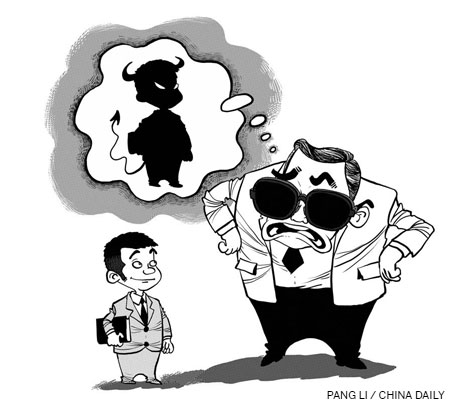False impression of post-80s kids
Updated: 2012-04-27 08:05
By Xiao Lixin (China Daily)
|
|||||||||

Post-1980 generation was adopted as the label for the first "products" of the family planning policy introduced in 1978. They have long been criticized and called "the most selfish, rebellious and even lost" generation. Many older residents claim that all the post-1980 children care about is money.
Such views are reinforced by reports that brides-to-be require money or other material gifts before they will consent to marry. In Heze, Shandong province, for instance, prospective grooms now need to find 136,000 yuan ($21,583) to seal their betrothals.
But can such an indictment be applied to the whole generation?
In fact, since the Qin Dynasty (221-206 BC) it has been a tradition for men to offer their brides-to-be a dowry, the value varying according to the regions and times. About three decades ago, such dowries consisted of a watch, a bike and a radio, which at the time were quite expensive although they might not seem that extravagant today.
It is natural for the value of dowries to increase with China's economic growth. Instead of blaming post-80s brides-to-be and their families for being too materialistic, perhaps we should look at the society they grew up in.
Born during the early stages of reform and opening-up, the nation has got richer as the post-1980 kids have grown up.
It is rich people's ostentatious displays of their wealth that are the real problem, as people naturally want to keep up with the Joneses. For instance, not long ago, a Shanxi billionaire spent 70 million yuan ($11 million) on his daughter's wedding, well beyond the means of most people.
While the whole of society seems to constantly doubt whether the post-1980 generation are capable of fulfilling their responsibilities to ensure China's future development, we should remember that it was the Paralympic fencer Jin Jing, born in 1981, who bravely protected the 2008 Olympic flame when someone tried to seize it from her during the torch replay in Paris; and we should remember the compassion this generation showed and the contribution they made to relief work after the Wenchuan earthquake in 2008.
In fact, many a heroic deed and noble contribution has been made by people of this generation, the young scientists and designers devote their time and efforts to China's space program.
Wu Juping, a worker in Hangzhou, East China's Zhejiang province, for instance, was hailed as the nation's "most beautiful mother" after she saved the life of a 2-year-old girl without thinking of her own safety in July 2011. If this generation is really as selfish and materialistic as critics allege, Wu would have simply ignored the tragedy that was about to unfold and simply walked away as other passers-by did.
If we claim that a whole generation is at fault, then there must be problems with the society in which they have been brought up and in which they live, in which case we need to pinpoint the problems and find solutions.
Young people live in a society that is completely different from the one their parents knew at their age and they have developed a different outlook on life.
A survey conducted by Wuhan University found that housing, marriage, the cost of supporting parents, insurance and healthcare are all heavy money related burdens on those in their 20s and early 30s.
Are the young people in their 20s to blame for wanting security?
People should be more tolerant and open-minded toward the post-1980 generation and their differences, rather than criticizing them because they are not like the older generation.
The author is a writer with China Daily.
xiaolixin@chinadaily.com.cn

 Relief reaches isolated village
Relief reaches isolated village
 Rainfall poses new threats to quake-hit region
Rainfall poses new threats to quake-hit region
 Funerals begin for Boston bombing victims
Funerals begin for Boston bombing victims
 Quake takeaway from China's Air Force
Quake takeaway from China's Air Force
 Obama celebrates young inventors at science fair
Obama celebrates young inventors at science fair
 Earth Day marked around the world
Earth Day marked around the world
 Volunteer team helping students find sense of normalcy
Volunteer team helping students find sense of normalcy
 Ethnic groups quick to join rescue efforts
Ethnic groups quick to join rescue efforts
Most Viewed
Editor's Picks

|

|

|

|

|

|
Today's Top News
Health new priority for quake zone
Xi meets US top military officer
Japan's boats driven out of Diaoyu
China mulls online shopping legislation
Bird flu death toll rises to 22
Putin appoints new ambassador to China
Japanese ships blocked from Diaoyu Islands
Inspired by Guan, more Chinese pick up golf
US Weekly

|

|







